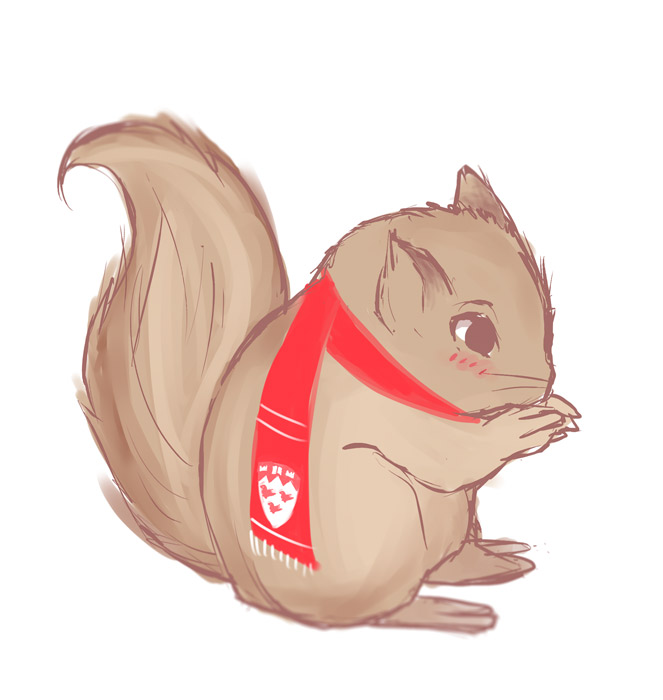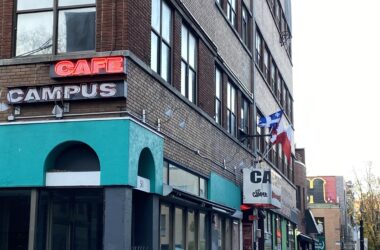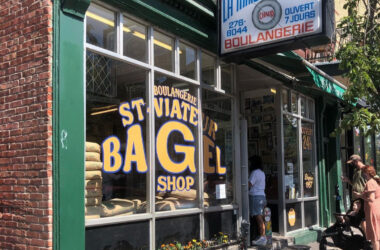McGill has been the target of some vile chattering. As good McGillians, we must stand up for our grey friends—mostly because they can’t speak for themselves. Ladies and gentlemen, I am addressing the University of British Columbia’s (UBC) student newspaper, The Ubyssey, and one article’s boast that UBC’s squirrels are more popular than McGill’s. Fortunately, their swaggering is rife with alternative facts, and McGill can rest easy knowing that its squirrels still reign supreme. The McGill Tribune tried reaching out for comments from our fuzzy friends, but since even our best endeavours failed, our perspective will mainly be that of Homo sapiens.
Ever since there have been students, there have been squirrel enthusiasts. Several universities have Facebook groups dedicated to posting pictures of the local critters, including “Squirrels of UBC,” “Squirrels of McGill,” and “Raccoons of SFU,” with The Ubyssey reporting them to have 4,000, 3,800, and 101 Facebook likes respectively. So while it’s true that UBC squirrels have the highest absolute number of likes, it’s a mistake to draw the conclusion that they are “narrowly beating” the other top Canadian universities. In reality, what really matters is the ‘likes per squirrel fanatic,’ or LPSF. By its 2015 numbers, UBC has 61,113 students, and McGill reports 40,493 as of 2016. Assuming all UBC students are squirrel fanatics, as we are, you’ll notice that McGill’s LPSF ratio is higher at 0.094 versus 0.065.
What’s more, one must factor in the geographic differences between campuses. Thanks to its comparatively smaller size, McGill is a close-knit, community-based campus, which provides a more authentic and personal squirrel spotting experience. McGill isn’t just a place to scurry for scraps—it’s a home. Meanwhile, it’s impossible to tell where UBC ends and the surrounding forest begins; the UBC label may be imposed upon squirrels that more accurately identify with the neighbouring Pacific Spirit Park.
Our environment is simply more suitable for squirrels. As any McGillian can tell you, our squirrels’ carefree attitude is only matched by their hefty weight. They are free to frolic across our campus. Thanks to the never-ending construction on the Sherbrooke and MacTavish streets, the constant police presence keeps dangerous carnivores at bay. Meanwhile, at UBC, coyotes prey freely on squirrels to the apparent disregard of onlookers. Indifferent Reddit users commented on the UBC subreddit, “I think I saw that [coyote] eat like three squirrels on three different occasions,” and “my bio prof saw it and called it natural selection in action.”
Additionally, McGill students’ relationships with the resident squirrels are superior. On campus, students and squirrels live in harmony. McGill squirrel fans should not be alarmed that the “Squirrels of UBC” page has more activity. This is easily explained by Montreal temperatures being so low that Arcade Fire wrote a song about it, so opportunities to take off our gloves to snap a pic are few and far between.
At the same time, our squirrels are too busy surviving and being conscientious citizens to pose for pictures. In a development exemplary of the close relationship between McGill’s squirrels and scholars, 2010 research by McGill Professor Murray Humphries revealed several cases of squirrels adopting the orphaned pups of their neighbours. UBC does not show any signs of embracing the research opportunities provided by their local critters, likely because their underachieving squirrels are too busy scavenging at a Lululemon to contribute to advancing scientific inquiry.
Thus, as with many things in life, the less calculable factors must be taken into consideration as well. Blanket statements based on minor details are not a proper foundation for which school’s squirrels are better. Besides, when it all comes down to it, squirrels of all furs, all across Canada, need to hunker down together for the next four years as we weather the storm of the big orange nut to our South.








